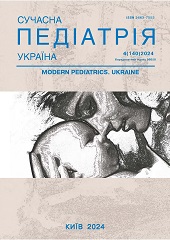Clinical report of Mediterranean fever in a child in Ukraine – Don’t miss it!
DOI:
https://doi.org/10.15574/SP.2024.140.93Keywords:
Mediterranean fever, children, gene mutation MEFVAbstract
Introduction. Familial Mediterranean fever (FMF) is a non-infectious genetic disease caused by a mutation in the MEFV gene. This disease is more common in people of Mediterranean or Middle Eastern descent, but can occur in any ethnic group, including those living European countries. FMF has typical clinical symptoms. Its long term without appropriate treatment the disease can lead to a violation of the child's physical development and result in the development of amyloidosis.
The aim is to focus the attention of the medical community of Ukraine and inform European medical specialists on the FMF cases due to migration changes in Ukraine.
This article presents a clinical case of FMF in a 4-year-old child who was admitted to our hospital with complaints of fever, abdominal pain, vomiting, and stool retention. Additional examination included: laboratory tests (complete blood count, urinalysis, biochemical blood test with determination of liver and kidney tests); instrumental methods: ultrasound examination of the abdominal organs and urinary system, X-ray examination of the abdominal organs with contrast. The results of additional tests revealed the signs of inflammatory process and impaired kidney function. When clarifying the family medical history, it was revealed that the older brother suffers from FMF (a mutation of the MEFV genotype was determined) and takes specific therapy (colchicine). The final diagnosis was determined: Acute strangulated intestinal obstruction. Familial Mediterranean Fever (clinically). Peritonitis. Operative laparoscopic and conservative treatment was performed. The patient was discharged in a satisfactory condition with appropriate recommendations.
Conclusions. The number of FMF cases in children have increased due to changes in the migration process in Ukraine. The relevance of this disease has increased. Taking into consideration a significant migration of population, the likelihood of an increase in the number of cases of FMF in European countries is increasing, which requires awareness among a wide range of doctors.In this report we have described a pediatric FMF case which was represented by recurrent episodes of fever, abdominal pain, impaired kidney function test results, and inflammatory markers. A determined mutation of the MEFV genotype in the brother of our patient makes the diagnosis of FMF unquestionable.
The research was carried out in accordance with the principles of the Helsinki Declaration. The informed consent of the patient was obtained for conducting the studies.
No conflict of interests was declared by the authors.
References
Ben-Zvi I, Herskovizh C, Kukuy O, Kassel Y, Grossman C, Livneh A. (2015, Mar 25). Familial Mediterranean fever without MEFV mutations: a case-control study. Orphanet journal of rare diseases. 10: 34. https://doi.org/10.1186/s13023-015-0252-7; PMid:25887307 PMCid:PMC4377009
Bettiol A, Lopalco G, Emmi G, Cantarini L, Urban ML, Vitale A et al. (2019, Apr 17). Unveiling the Efficacy, Safety, and Tolerability of Anti-Interleukin-1 Treatment in Monogenic and Multifactorial Autoinflammatory Diseases. International journal of molecular sciences. 20(8): 1898. https://doi.org/10.3390/ijms20081898; PMid:30999610 PMCid:PMC6514653
De Sanctis S, Nozzi M, Del Torto M et al. (2010, Sep 3). Autoinflammatory syndromes: diagnosis and management. Italian Journal of Pediatric. 36(1): 57. https://doi.org/10.1186/1824-7288-36-57; PMid:20813071 PMCid:PMC2941754
Maggio MC, Corsello G. (2020). FMF is not always «fever»: from clinical presentation to «treat to target». Italian journal of pediatrics. 46(1): 7. https://doi.org/10.1186/s13052-019-0766-z; PMid:31941537 PMCid:PMC6961393
Manna R, Rigante D. (2019, May 1). Familial Mediterranean Fever: Assessing the Overall Clinical Impact and Formulating Treatment Plans. Mediterranean journal of hematology and infectious diseases. 11(1): e2019027. https://doi.org/10.4084/mjhid.2019.027; PMid:31205631 PMCid:PMC6548206
Migita K, Asano T, Sato S, Koga T, Fujita Y, Kawakami A. (2018). Familial Mediterranean fever: overview of pathogenesis, clinical features and management. Immunological medicine. 41(2): 55-61. https://doi.org/10.1080/13497413.2018.1481579; PMid:30938266
Orning P, Lien E, Fitzgerald KA. (2019, Nov 4). Gasdermins and their role in immunity and inflammation. The Journal of experimental medicine. 216(11): 2453-2465. https://doi.org/10.1084/jem.20190545; PMid:31548300 PMCid:PMC6829603
Ozdogan H, Ugurlu S. (2019). Familial Mediterranean Fever. Presse medicale (Paris, France: 1983). 48; 1 Pt 2: e61-e76. https://doi.org/10.1016/j.lpm.2018.08.014; PMid:30686512
Özen S, Batu ED, Demir S. (2017, Mar 23). Familial Mediterranean Fever: Recent Developments in Pathogenesis and New Recommendations for Management. Frontiers in immunology. 8: 253. https://doi.org/10.3389/fimmu.2017.00253; PMid:28386255 PMCid:PMC5362626
Schnappauf O, Chae JJ, Kastner DL, Aksentijevich I. (2019). The Pyrin Inflammasome in Health and Disease. Frontiers in immunology. 10: 1745. https://doi.org/10.3389/fimmu.2019.01745; PMid:31456795 PMCid:PMC6698799
Yaremenko OB, Sydorova AO. (2020). Simeina serezemnomorska lykhomanka: ohliad suchasnoho stanu problemy ta opysannia klinichnoho vypadku. Revmatolohichnyi zhurnal. 81(3). https://doi.org/10.32471/rheumatology.2707-6970.81.15575
Downloads
Published
Issue
Section
License
Copyright (c) 2024 Modern pediatrics. Ukraine

This work is licensed under a Creative Commons Attribution-NonCommercial 4.0 International License.
The policy of the Journal “MODERN PEDIATRICS. UKRAINE” is compatible with the vast majority of funders' of open access and self-archiving policies. The journal provides immediate open access route being convinced that everyone – not only scientists - can benefit from research results, and publishes articles exclusively under open access distribution, with a Creative Commons Attribution-Noncommercial 4.0 international license (СС BY-NC).
Authors transfer the copyright to the Journal “MODERN PEDIATRICS. UKRAINE” when the manuscript is accepted for publication. Authors declare that this manuscript has not been published nor is under simultaneous consideration for publication elsewhere. After publication, the articles become freely available on-line to the public.
Readers have the right to use, distribute, and reproduce articles in any medium, provided the articles and the journal are properly cited.
The use of published materials for commercial purposes is strongly prohibited.

